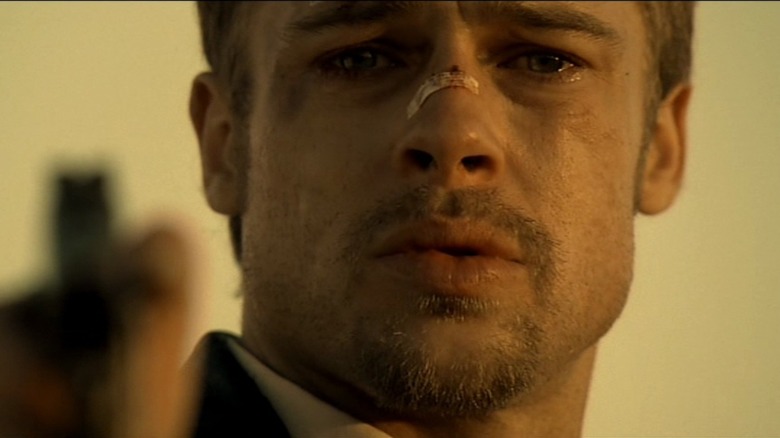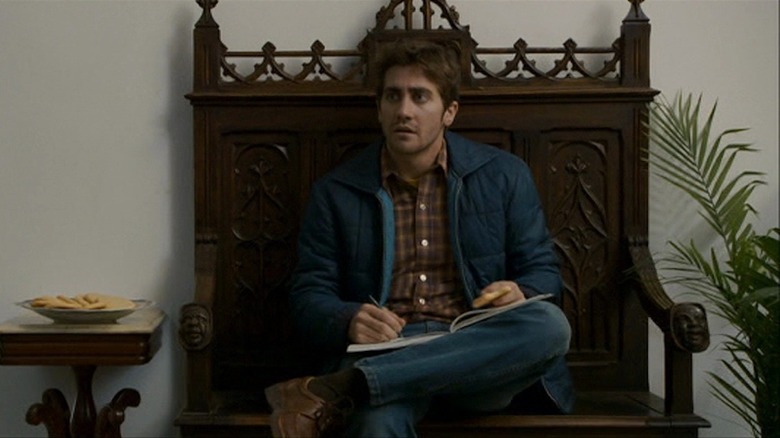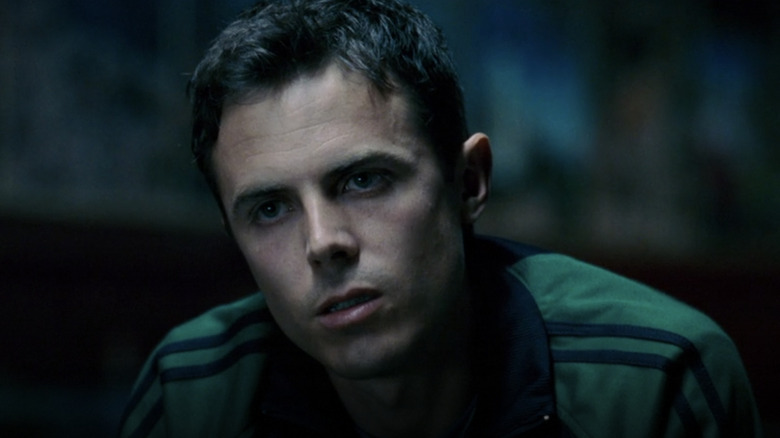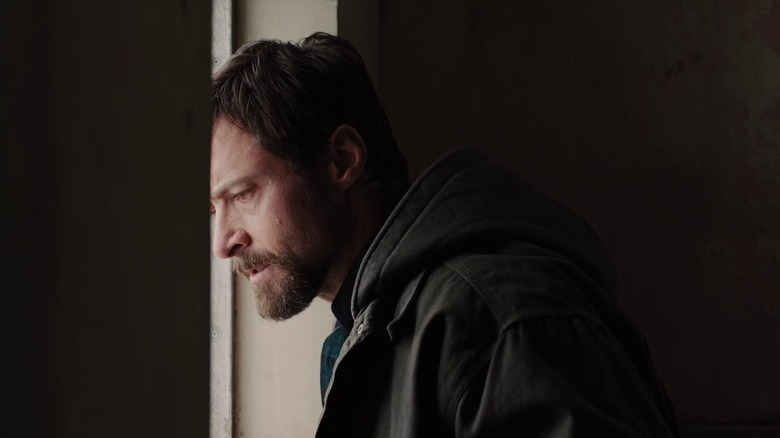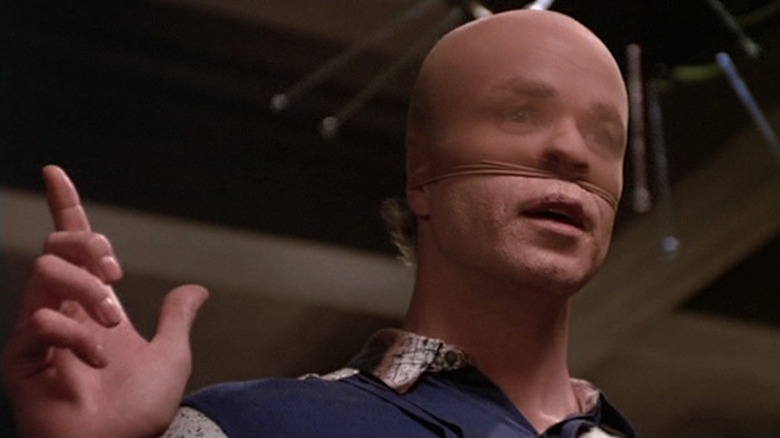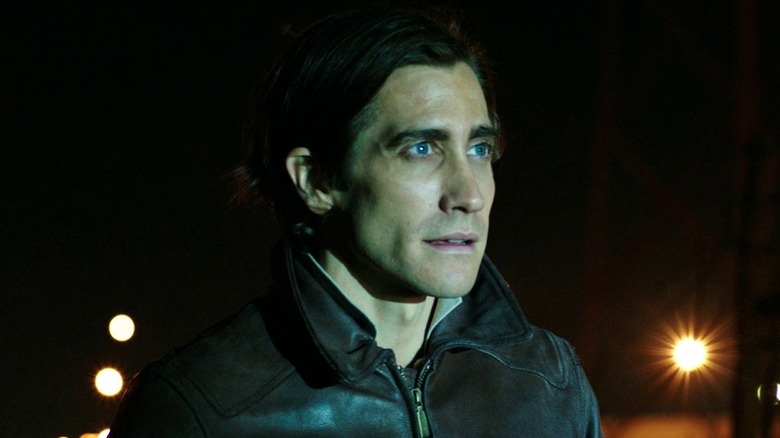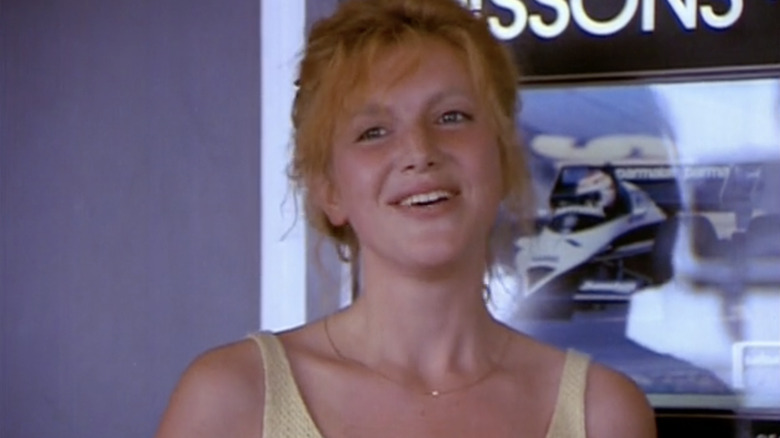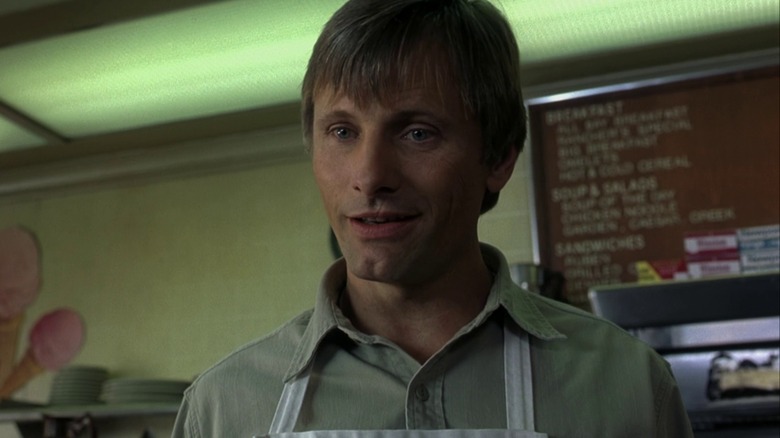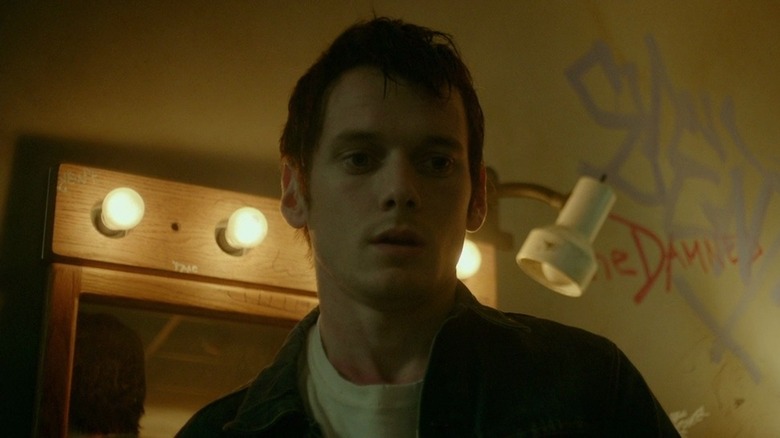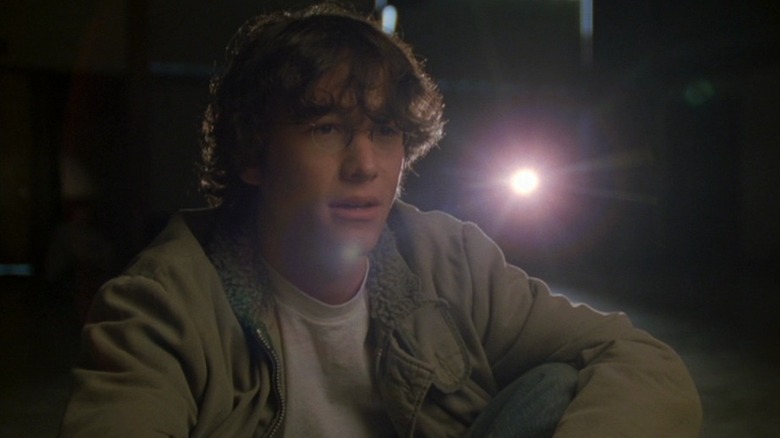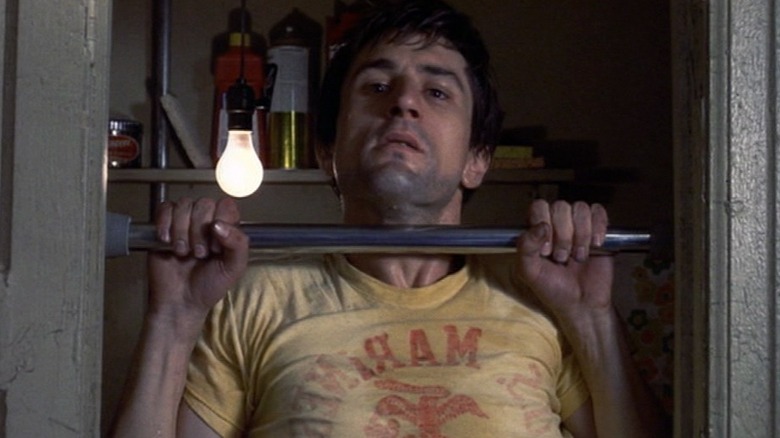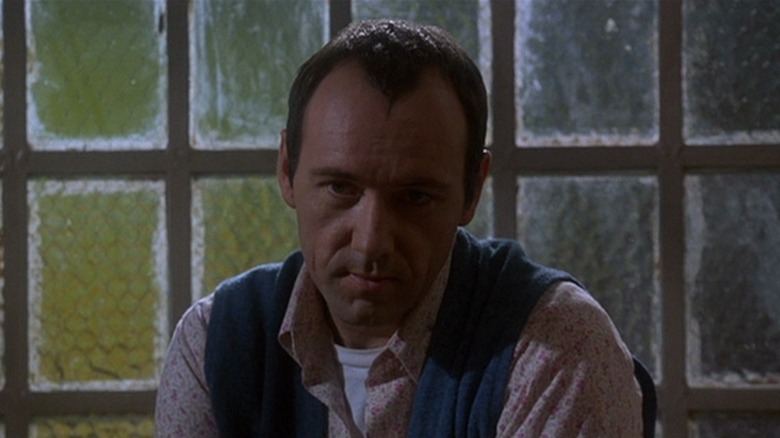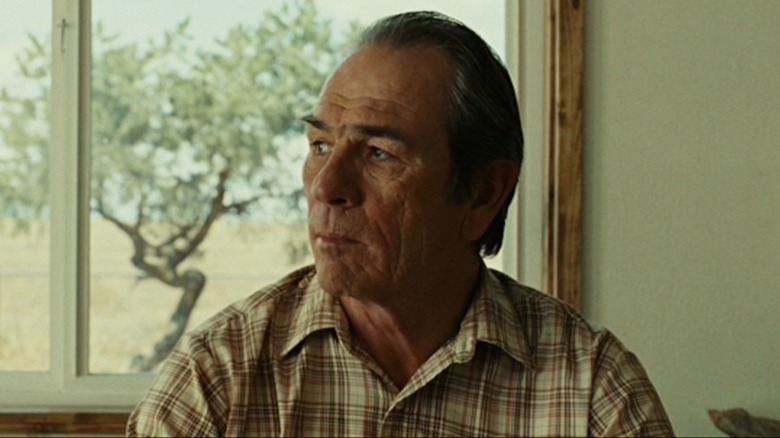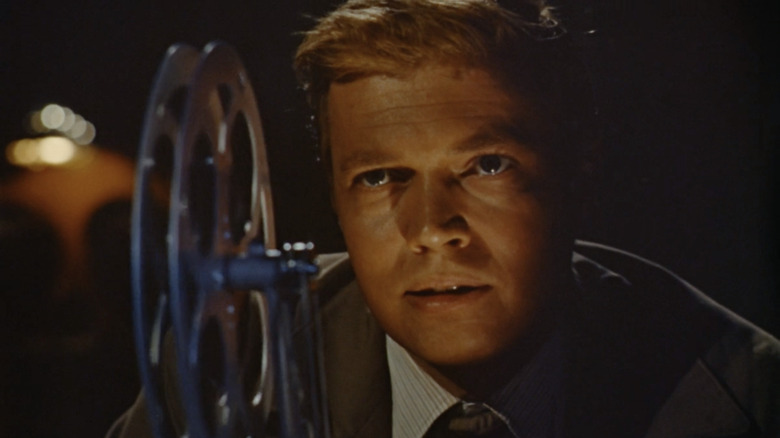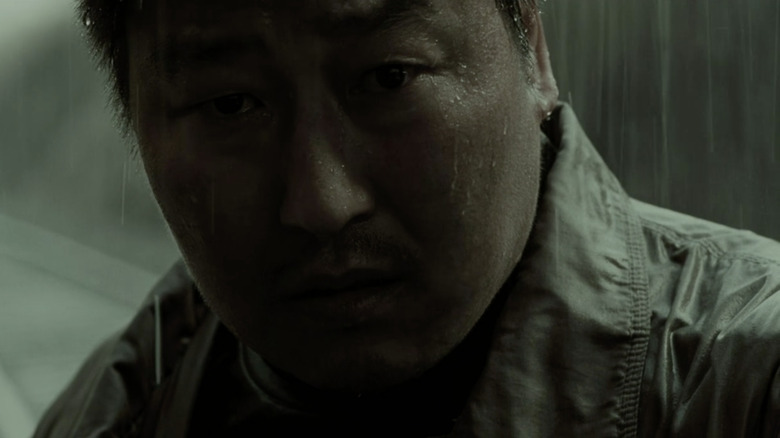Movies Like Se7en That Crime Thriller Fans Need To See
Gritty, thrilling, and with a sense of darkness that puts most horror movies to shame, David Fincher's 1995 thriller "Se7en" is a movie audiences have come back to time and time again.
There are a lot of reasons why people can't let it go. After all these years, John Doe's grisly, miserable executions — all framed as moral killings, with each victim embodying one of the seven deadly sins — is still nightmare fuel. There's an inventive but practical cruelty to them that engraves each permanently on the audience's memory.
Then, of course, there are the performances. Morgan Freeman, Brad Pitt, Gwyneth Paltrow, and Kevin Spacey all excel here. Each play archetypes as much as characters, evoking larger-than-life, universal ideas that feel real and symbolic at the same time. But perhaps most importantly, the film has that unforgettable quality shared by all great movies, regardless of genre. Once you've seen it, you'll never forget it. Even the way it looks — its greenish filters, its grimy and rain-drenched sets — has become a touchstone of pop culture.
It's an iconic film — one of the best thrillers you can find — and if you want to find more like it, here are some pre- and post- "Se7en" classics that hit many of the same haunting notes. Just remember to keep the lights on.
Zodiac (2007)
"Zodiac" offers a detailed chronicle of the investigation of the real-life Zodiac murders, operating with restraint but never giving you anything less than a fascinating — and often frightening — movie. It's also a psychologically realistic study of the effect that these kinds of searches can have on the people conducting them: We see downward spirals, obsessions, burn-outs, and a lot of weariness. It's more grounded than "Se7en," but it touches on some of the same themes. And you get the feeling that Detective Somerset, at least, would recognize a lot about this kind of exhaustion.
Plus, since it's another David Fincher movie, you know you'll be getting the same kind of excellence, particularly when it comes to a haunting mood and terrific performances. Think of "Se7en" as Fincher's horror take on serial killers and "Zodiac" as his crime procedural. As The Village Voice said in its 2007 review, "With a runtime of over two and a half hours, this relentlessly swift film super-charges every minute with a maximum of minutiae. ['Zodiac' is] dizzyingly dense, intricate in the extreme." It excels at evoking the feeling of searching — patiently and exhaustively — for a truth that you may never be able to get to. Remember, the Zodiac case remains famously unsolved.
Gone Baby Gone
By the end of "Gone Baby Gone," you'll probably be thinking about a certain "Se7en" quote: "Ernest Hemingway once wrote, 'The world is a fine place and worth fighting for.' I agree with the second part."
"Gone Baby Gone" plunges you into another dark, high-stakes crime that seems to reveal the worst side of humanity — and ultimately pushes the detectives investigating it to a breaking point. Private eyes Patrick Kenzie (Casey Affleck) and Angie Gennaro (Michelle Monaghan) are hired to find a missing 4-year-old girl, and every lead they follow up on suggests that it's unlikely their search will have a happy ending. This is a grim case, one where they can't even trust the girl's own mother, Helen, who is neglectful and almost constantly high. And when — after far too much bloodshed — they finally have an answer, they don't know what to do with it. How do you live a moral life in a world this broken?
This is a movie that is strong throughout, but lifted to a whole new level by its ending. When the credits roll, you'll feel like you just got hit on the head by a two-by-four: You know, the same feeling you had when you finished "Se7en."
Prisoners (2013)
Grim, foreboding, and openly loaded with symbolism, philosophy, and mythology, "Prisoners" is a tough ride to go on — but in structure, tone, and content, it's hands down one of the films out there that's the most like "Se7en."
It starts off as a relatively grounded crime thriller: Two little girls go missing over Thanksgiving. But then we get a detective named Loki (Jake Gyllenhaal), who unravels the case to gradually reveal a "war on God" that involves labyrinths, snakes, and parental vengeance. The little girls' parents — especially one father, Keller, played by a defiantly uncharming Hugh Jackman — pursue their own horrific line of investigation. Keller remains convinced that Alex (Paul Dano), the intellectually disabled man the police initially arrested, is responsible for the girls' disappearance. His solution? Torture the information out of him, using a brutally simplistic, easily rigged system that will haunt the viewer. As Loki closes in on the truth, Keller's journey into his own heart of darkness leads him in similar directions ... but may play right into the kidnappers' hands.
Throw in some distinctive, starkly beautiful visuals and another killer ending, and you have a movie that's both nightmarish and memorable.
Manhunter (1986)
Like "The Silence of the Lambs" — a stone-cold classic in its own right — "Manhunter" is a Hannibal movie that showcases the same kind of darkness and determined protagonists as "Se7en." William Petersen plays Will Graham, an FBI profiler who reluctantly comes back from early retirement to try to solve a particularly violent string of murders committed by "the Tooth Fairy" (Tom Noonan). To re-familiarize himself with getting inside a killer's head, he visits the worst one he ever caught: Dr. Hannibal Lecktor (Yes, we know it's generally Lecter, but in the end credits here he's listed as "Doctor Lecktor." No, we don't know why.)
"Manhunter" is a movie stuffed full of great performances, from Petersen's icy and perfectly focused intelligence to Noonan's ability to terrify you and touch your heart at the same time. But we have to single out Brian Cox's Hannibal: He's less of a showman than Anthony Hopkins' version, but he's every bit as capable and deadly. And his affable, almost normal charm can make your skin crawl. It all adds up to a hero vs. villain setup for the ages.
Nightcrawler (2014)
Violence gets attention. That's what John Doe argues in "Se7en," and in "Nightcrawler," we see it play out in the nightly news. Enterprising sociopath Lou Bloom (a cadaverous-looking Jake Gyllenhaal) attaches himself to the world of TV news, where if it bleeds, it leads. There's a brisk market for footage of bloody accidents and suburban crime — anything that rewards both paranoia and titillation. Soon, Bloom is a success story. Maybe he deserves to be: This is a guy who will do whatever it takes to get the right shot. And if there isn't a good news story, he'll make one.
Gyllenhaal's performance is the main draw here, as he makes Bloom both hypnotic and repulsive. You can't help having a queasy admiration for his sense of cunning, but what he does with it is downright chilling.
This evokes the same grime and cynicism of "Se7en," with the key difference that here, there's no one around to really comment on how messed up it all is. Instead, we're living with characters who are skilled at getting by in this kind of world. They might even love it.
The Vanishing (1988)
The 1988 Dutch film "The Vanishing" has an irresistible premise that should appeal to "Se7en" fans — especially the ones who would open that box at the end. Ordinary couple Rex (Gene Bervoets) and Saskia (Johanna ter Steege) stop at a rest area, and Saskia goes inside to buy them some drinks. As far as Rex knows, she never comes out again.
Her abrupt, unexplained disappearance haunts the rest of Rex's life — long after he's moved on romantically, he's still obsessed with finding out what happened to Saskia. And we only know a little more than he does. We've seen the culprit, a superficially normal family man who meticulously and chillingly planned an abduction. But we don't know what happened after he found Saskia. We can only find that out when Rex does, as he and the killer come to a strange and unsettling deal.
A chilling study of the costs of being unable to walk away, "The Vanishing" is, as Roger Ebert put it, "a thriller about knowledge — about what the characters know about the disappearance, and what they know about themselves." It's an irresistible philosophical hook, and it comes with one of cinema's most horrifying endings.
A History of Violence (2005)
The weight and consequences of a life spent in darkness come to the fore in the riveting "A History of Violence." Viggo Mortensen stars as Tom Stall, a man who accidentally shatters the quiet small town life he built so carefully. He's spent years as an ordinary diner owner, but one day, the wrong men come inside. They're a threat — and he takes them out far too swiftly and effectively to really be the man he's pretending to be.
His actions make him a hero, and the media is happy to give him his five minutes of fame. But the coverage reveals him to the people he's been hiding from, people who know all about his criminal past and are eager to use it for their own gain. If Tom doesn't cooperate, they're happy to use his family as leverage. One way or another, it looks like he'll have to accept the man he used to be. It's just hard to know if he'll have anything left at the end of it.
Like "Se7en," the film is simultaneously grueling and entertaining. It gives you all the dark thrills you could want, but it also makes you think about the cost living through it all might have on the human soul.
Green Room (2015)
If you like tense thrillers with terrifying but compelling villains, look no further than the propulsive "Green Room." The film centers on a punk band traveling from show to show. They're broke enough to have to siphon gas to keep their van on the road, so they can't turn down a gig — even if it does turn out to be at a rural neo-Nazi bar. But when it's time to go, Pat (Anton Yelchin) realizes he left his phone in the green room. He goes back for it — and witnesses the tail end of a brutal murder. The skinheads barricade the band in the green room until they can decide what to do with them. They just have to wait for their leader (a calm and scary Patrick Stewart) to arrive.
When he does, his orders are clear: No one gets out alive. The movie turns into an unbelievably tense, gory siege where the band — and their reluctant ally — have to try to escape the bar and get to safety even though they're surrounded by better numbers and better weapons.
You won't be able to look away. As The Atlantic's 2016 review said, this is "a tense gore-fest, one that's as grimy and claustrophobic as the titular room. But scrape off the scum, and you'll find ... visual artistry, dark humor, smart writing, and glints of humanity." All of which makes it a good, adrenaline-fueled match for "Se7en."
Brick (2005)
Long before Rian Johnson came to "Star Wars," he made his directorial debut with an unconventional neo-noir. "Brick" puts the darkness and moral weight of "Se7en" smack in the middle of a California high school, and — in a daring move that, against all odds, actually works — puts the stylized dialogue of classic noir films in the mouths of teenagers.
The movie turns on a great performance by a young Joseph Gordon-Levitt. He plays Brandon, a high school student who gets a mysterious, frightening phone call from his ex-girlfriend Emily. Emily then vanishes, and Brandon tries to track her down through a world of drug deals, popular kid parties, manipulations, and lies.
The important thing here is the atmosphere, and "Brick" pulls that off: This movie has texture and moodiness to spare. As Rolling Stone's Peter Travers put it in his 2006 review, "Johnson plunges off the deep end, risking ridicule by shaping this spellbinder with grit and gravitas." It's not realistic. But it's grim and, like "Se7en," it has teeth. You'll feel its bite long after the credits have rolled.
Taxi Driver (1976)
For another cynical look at urban decay and psychological pressure, check out Martin Scorsese's classic "Taxi Driver." Robert De Niro plays Travis Bickle, an isolated, increasingly disturbed man who exists on the night side of New York: a bleak world full of sex, violence, and degradation. Travis is carrying around a lot of darkness, and sooner or later, it's going to leak out into the world. The movie focuses on how thin a line there might be between a villain and a so-called hero, if they're both motivated by the same unstable urges. Is he going to be a political assassin? Or an acclaimed vigilante?
One of the most powerful parts of "Taxi Driver" is that Travis' loneliness is both palpable and relatable. Most of us have hopefully never come close to being John Doe, but Travis — clumsily trying to reach out and always being a little too off-putting to everyone — hits closer to home. His descent is terrifying, but we can also understand his mind every step of the way. That's the balancing act that makes "Taxi Driver" one of the best films of all time.
The Usual Suspects (1995)
"The Usual Suspects" has a lighter tone than "Se7en," and its crime plot is more about greed, deception, and strategy than grim and merciless preaching. But it has the same masterful plotting, full of twists and leading to a truly iconic ending.
The story is framed as the meandering explanation con artist "Verbal" Kint (Kevin Spacey) gives to Agent Dave Kujan (Chazz Palminteri), the hard-nosed man determined to unravel the circumstances behind a dockyard massacre. Verbal lays out how a group of career criminals all picked for the same lineup decided to work together — and then had that decision made for them by the mysterious Keyser Söze, an elusive underworld figure whose reputation terrifies even the toughest of crooks. Söze demanded a high-stakes job from Verbal and his colleagues, but everything went wrong.
"The Usual Suspects" could rest solely on its magnificently handled revelations, but instead, it also offers a smart, witty, and incredibly quotable script. Like "Se7en," it deals with criminality in almost mythic terms: We walk away feeling like we've delved into the nature of evil itself.
No Country for Old Men (2007)
If what you liked about "Se7en" was the sense of coming up against an almost unfathomable darkness, pick up "No Country for Old Men" immediately. This Western neo-noir offers up an antagonist as scary and joyless as John Doe — but this one almost feels like a force of nature.
Anton Chigurh (Javier Bardem) is relentless in his quest to track down a stolen bag of money, and it doesn't matter how many dead bodies he leaves in his wake. He'll kill for revenge, convenience, or simple whim. With his bowl cut and his cattle-killing captive bolt pistol, he's also just uncanny — an otherworldly presence matched against the resourceful but very human Llewelyn Moss (Josh Brolin). Both of them are followed by the weary Sheriff Ed Tom Bell (Tommy Lee Jones), who has seen too much over the course of his career and doesn't know if he'll be able to see all this too. He and Morgan Freeman's Somerset would have a lot to talk about.
With its stunning cinematography, high-caliber performances, excruciating tension, and entrancing sense of place, "No Country for Old Men" is essential viewing.
Peeping Tom (1960)
With its intensity, psychological insight, and a level of darkness some found over-the-top, "Peeping Tom" appalled critics on its original 1960 release. Up until then, as The Telegraph recounted in a 2010 retrospective celebrating the film's 50th anniversary, director Michael Powell had gotten nearly universal acclaim for his work; "Peeping Tom" essentially tanked his career.
It got, in short, a level of shocked vitriol that you might expect from a film that prefigures "Se7en." So you should go ahead and pick up "Peeping Tom" — and be grateful that it's now considered a psychological horror classic, which makes it a lot easier to find. It's the story of the shy, damaged Mark Lewis (Carl Boehm), a photographer and cameraman obsessed with killing women and capturing the final expressions of terror on their faces.
Like "Se7en," this film casts a cold eye on the kind of society that would produce this sort of person: The London cityscape is grimy and full of perversion and exploitation. Mark isn't the only voyeur around; the difference between him and the rest of his business almost feels more like a matter of degree. The film even makes you question your own role in the proceedings.
Memories of Murder (2003)
Like "Se7en," the Korean thriller "Memories of Murder" follows detectives faced with a crime bleaker and more disturbed than anything they've been faced with. The case doesn't reach John Doe's levels of baroque sadism, but it's more than enough for a small town detective — and eventually even the Seoul bigshot who joins him is overwhelmed by what they're seeing. Director Bong Joon-ho's characteristic dark humor provides a lot of energy and edge, making this part social satire: The "investigative techniques" of brutality and guesswork are as hard to take as the crimes.
The movie even has the same rain and griminess that characterize "Se7en." Once Detective Park Doo-man (Song Kang-ho) looks at the two bodies left in a drainage ditch, the peaceful countryside and golden fields around him seem to vanish. We're in a darker place now, and even the visuals know it.
The film is a masterpiece, one that Sight & Sound named as one of their key films of the 2000s: It's "a devastating story about the failures of both corruption and rigour," one where there's no sure way to prevent or even avenge evil. All you can do, in "Memories of Murder," is try to live with your own conscience.
